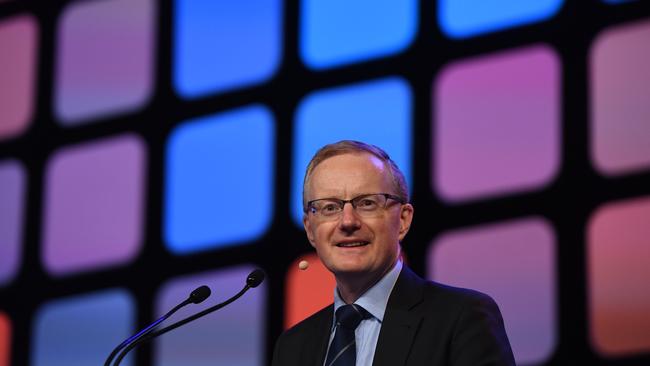Trump tariff: RBA governor warns of global shockwave
Markets flailed after the resignation of Donald Trump’s chief economic adviser Gary Cohn.

Global financial markets were roiled yesterday by the resignation of Donald Trump’s chief economic adviser Gary Cohn as the President pressed ahead with his “America First” policy.
The comments came as the Reserve Bank of Australia stepped in to the debate on tariffs warning that a trade war would be a “very big shock” to the global economy.
After a sharp sell-off last week when Mr Trump backed the maximum tariffs on imported steel and aluminium recommended by the Department of Commerce, shares, commodities and the currencies of commodity-producing nations like Australia and Canada were back on the ropes yesterday.
Analysts said the resignation of Mr Cohn — a leading proponent of free trade — had renewed fears about a trade war, which could disrupt the strong global economic outlook. “This is massive in many ways from a financial markets perspective,” said Saxo Bank global macro strategist Kay Van-Petersen. “Cohn was the one semblance of stability in the White House.”
Mr Cohn led a series of briefings with Australian business leaders in Washington last week, including Visy chairman Anthony Pratt, outgoing Commonwealth bank chief executive Ian Narev, and Qantas chairman Leigh Clifford as part of the as part of Malcolm Turnbull’s official US visit.
Dow Jones index futures initially fell 1.8 per cent, Australia’s S&P/ASX 200 share index fell 1.1 per cent and the Australian dollar declined 0.7 per cent to US77.72c before a slight recovery late yesterday.
US stock index futures were pointing to falls of more than 1 per cent on Wall Street overnight. “One of the big siren voices counselling Trump against erecting trade barriers — (Treasury Secretary Steven Mnuchin) being the other — has gone, adding to the risks that there’s more where the steel and aluminium tariffs came from,” said Ray Attrill, head of FX strategy at NAB. BlueScope CEO Mark Vasella said yesterday the tariff proposal had created uncertainty. “It’s been very hard for us to get a line on this,” Mr Vasella told a business forum in Sydney.
In Asia, the Nikkei 225 fell 0.8 per cent and the Hang Seng fell 1 per cent, while China’s Shanghai Composite was down 0.6 per cent and Korea’s KOSPI index fell 0.4 per cent.
Industrial commodities lost ground, with West Texas crude oil futures down as much as 1.2 per cent to $US61.83 a barrel and London Metal Exchange copper futures falling 0.6 per cent to $US3.14 a pound. Australian Commonwealth Government 10-year bond yields fell 3 basis points to 2.79 per cent after equivalent US yields fell as much as 5 per cent to 2.84 per cent on Mr Cohn’s departure.

Saxo’s Mr Van-Petersen said Mr Cohn’s departure from the White House will leave the protectionists like Secretary of Commerce Wilbur Ross and Director of Trade, Industrial Policy Peter Navarro and Trade Representative Robert Lighthizer in the ascendancy. “The risk of a broader US campaign of tariffs has drastically increased because Cohn was one of the few people who seemed capable of curbing Trump,” Mr Van-Petersen said.
The Trump administration is considering clamping down on Chinese investments in the US by slapping tariffs on a broad range of its imports in response to alleged intellectual-property theft, Bloomberg reported yesterday, citing insiders. Under the most severe scenario that could stem from the US Trade Representative’s 301 investigation into China’s intellectual property practices the US could impose tariffs on a range of Chinese imports, from shoes to consumer electronics. And the tariffs could be combined with curbs on Chinese investments in the US, which are reviewed for national-security risks by the Committee on Foreign Investment in the US, the Bloomberg report said.
It came as the RBA governor Lowe said Mr Trump’s announcement of a 25 per cent tariff on steel and a 10 per cent tariff on aluminium was “highly regrettable and bad policy”. “If it’s just confined to the current higher tariffs on steel and aluminium, then I think it’s manageable for the world economy,’ Dr Lowe said. “This could turn very badly though if it escalates. If we see retaliation and a counter-retaliation, this could turn into a very big shock for the global economy. So the best thing for everyone to do, perhaps even the hardest thing to do, is just to sit still and do nothing, to not respond and to continue advocating for open trade.”
IG chief market strategist Chris Weston said attention would turn to Mr Trump’s choice of replacement for Mr Cohn, as well as any potential reaction from other countries, particularly China. “The removal of Gary Cohn really gives the protectionist camp the leeway to enact pretty much whatever they like here, but you’ve got to bring China and Europe into it because the protectionist measures are aimed at any countries that are running decent trade surpluses with the US,” he said. “Ultimately at this late stage in the economic cycle, the question is whether there’s downside risk to global economic growth. China really needs strong global economic growth.”
Potential for faster than expected US interest rate hikes was also a niggling concern for markets. Federal Open Market Committee member Lael Brainard — who’s normally dovish on monetary policy — said this week many of the forces that acted as headwinds to US growth and weighed on policy in previous years are now generating tailwinds currently.



